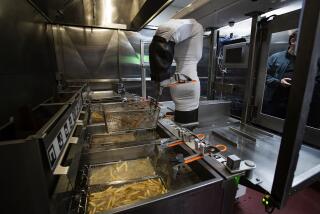Packaging Made Perfect : Gone Are the Days of Picking Out the Rejects by Hand
- Share via
Ever wonder how food packagers get so many perfectly shaped almonds into millions of bags stacked on grocery shelves across the land?
It’s simple, according to Key Technology Inc. The Walla Walla, Wash.-based maker of machinery for food packaging has developed an assembly line machine that quickly scans zillions of almonds, shoots the flawless specimens into one basket to fill those attractive packages on the shelf, and sends the chipped almonds into another basket for other uses.
The heart of the machine is a highly sophisticated computer with a built-in video camera.
In a similar vein, Eric Holmes, an engineer for White Cap Inc., a Downers Grove, Ill.-based packaging concern, says his company has a solution to the problem of defective bottle caps and containers that somehow don’t get filled to food processors’ standards in the packaging process. A computer-aided vision-detection system scans the assembly line for defective caps and measures the level of fluid in containers. “From the time the system determines it’s a reject, it kicks it off the line,” Holmes said.
Such quality-control solutions in food packaging are evolving because of computer-aided technology. Long gone are the days when assembly-line workers meticulously picked out defective products as they rolled along on a conveyor belt.
Computer technology “gives you an exact separation,” said Keith Gait, a sales representative for Simco/Ramic Corp., which handles packaging for companies such as RJR Nabisco Holding Corp.’s Nabisco Foods Group, which makes Oreo cookies, a variety of crackers and other snack foods.
Simco uses a computer-based shape- and color-sorter machine to package snack foods. Instead of having a worker pick out all the yellow Gummi Bears, for example, the machine automatically sorts faster and more accurately according to a variety of standards, Gait said. He, like Holmes and representatives of Key Technology, was in Los Angeles on Friday showing off the newest technology in food packaging to a food processors convention.
For the $400-billion-a-year food processing industry, packaging is almost as important as the product itself. Product safety is a major issue, food processors say, but efficient packaging can also entice consumers to buy larger amounts of a product than they would otherwise, said John B. Perkins, technical marketing manager for Mead Corp., an Atlanta-based maker of machinery for food packaging. For instance, if a 24-pack of soft drinks can be easily carried, he explained, a customer may be more willing to buy it to save time and money.
Another major concern among food processors is access to cost-efficient packaging.
One of the latest developments in the quest for the most efficient packaging machinery involves the use of servomotors, which are more efficient and adjustable than chains and sprockets.
They are ideal for interaction with computers, allowing engineers--through touch-screen programs--to easily manipulate machines that package beverages.
Mead has developed the Cluster-Pack 850, a packaging machine run entirely by servomotors and high-speed computers. The computer indicates what may go wrong in the packaging process and communicates to engineers the necessary corrections as it makes periodic diagnostic checks of the Cluster-Pack system. The system can produce up to 400 packages a minute.
“Push a button and by a program in a computer, they (servomotors) know where to go,” Perkins said. Thus, when packagers change the machine format from a six-pack to a 12-pack configuration, it only takes two minutes, rather than half an hour of cumbersome sprocket changes, Perkins said.
Changes in the food packaging industry are consumer-driven. It was customer suggestions that sent Mead engineers back to the drawing board two years ago to design the Cluster-Pack 850 after consumers demanded handier beverage packages.
In a similar fashion, in the late 1970s, children cut their tongues while licking the metal caps of tapioca pudding cups. Philadelphia-based Automated Container Corp. designed what manager Bob Morrison calls a “double safe end.”
“We developed a lid where you cannot cut your tongue if you lick it for whatever reason,” he said.
More to Read
Inside the business of entertainment
The Wide Shot brings you news, analysis and insights on everything from streaming wars to production — and what it all means for the future.
You may occasionally receive promotional content from the Los Angeles Times.










